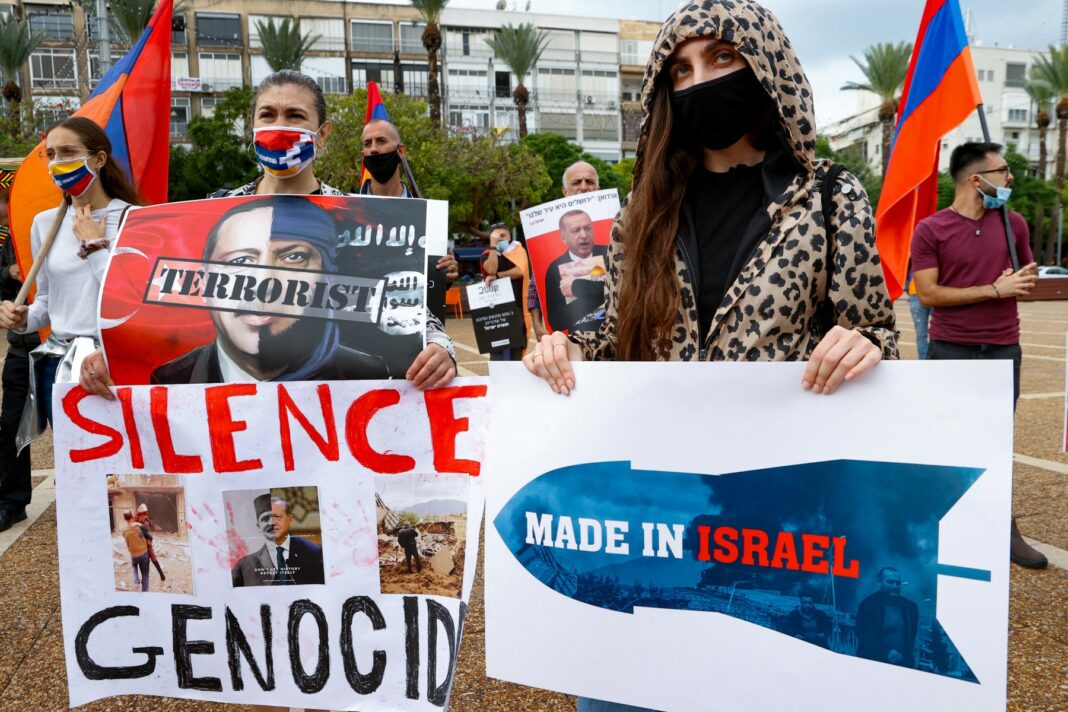Armenia announced its official recognition of an independent Palestinian state on Friday in a move that has angered the Israeli government, which in turn is accused by Armenians of supporting Baku in its conflict with Yerevan, while Azerbaijan is facing protests in İstanbul for supplying crude oil to Israel via a pipeline running through Turkey.
Armenia’s decision follows that of countries like Spain, Ireland and Norway, which recently recognized Palestine due to Israel’s military offensive in Gaza.
The Israeli Foreign Ministry quickly responded, summoning the Armenian ambassador, Arman Hakobyan, for a “harsh reprimand,” according to a statement from the ministry.
#Armenia recognizes State of #Palestine
Our position has consistently been in favour of a peaceful & comprehensive settlement of the Palestinian issue, & we support the "two-state" solution to the Israeli-Palestinian conflict.
Reaffirming our commitment to int’l law &… pic.twitter.com/SoF7KLLGr7
— MFA of Armenia
(@MFAofArmenia) June 21, 2024
In a statement published on its website, the Armenian Foreign Ministry expressed deep concerns over the “catastrophic humanitarian situation in Gaza and the ongoing military conflict,” while firmly rejecting violence against civilians and hostage-taking.
In October 2023 Tel Aviv declared the country was at war after an unprecedented Hamas incursion that resulted in the death of 1,200 people in the country and the taking of some 250 hostages.
At least 37,551 Palestinians have been killed in Israel’s ongoing offensive on the Gaza Strip since October, the health ministry in the besieged enclave said on Saturday.
“Based on the foregoing and reaffirming our commitment to international law and the principles of equality, sovereignty, and peaceful coexistence of peoples, the Republic of Armenia recognizes the State of Palestine,” the Armenian statement read, emphasizing Armenia’s support for a “peaceful and comprehensive” resolution to the Palestinian issue, advocating for the two-state solution based on the 1967 borders.
The Palestinian presidency hailed Armenia’s move as a “courageous and significant decision.” In a statement, the presidency said, “This recognition contributes positively to preserving the two-state solution, which faces systematic challenges, and promotes security, peace, and stability for all parties involved,” urging other nations to follow Armenia’s example.
With Armenia’s decision, the total number of countries recognizing Palestine has risen to 145 of the 193 United Nations member states, including major powers like Russia and China. However, important Western countries such as the United States, France and Canada have yet to recognize a Palestinian state.
Imagine what he’d think about Israel siding with Turkey in denying the Armenian Genocide and with Azerbaijan to commit a new genocide with Israeli weapons.
Armenia didn’t side with Turkey, it sided with 144 (of 193) other countries that recognize Palestine’s right to exist. https://t.co/XjrD4PXW2w pic.twitter.com/LmIyflPAqJ
— Christopher Khachadour #ArtsakhIsArmenian (@ChrisKhach) June 22, 2024
Armenia annually commemorates the massacre of as many as 1.5 million Armenians by the Ottoman Empire during World War I, an event recognized by the United States in 2021 as genocide. Armenia’s recognition of Palestine also highlights the complex geopolitical dynamics in the region, including its ongoing territorial dispute with Israeli-backed Azerbaijan over the Nagorno-Karabakh region.
#Israel furious about #Armenia recognizing the Independence of #Palestine.
You kept for too long using the #ArmenianGenocide as your political tool to “threaten” #Turkey.
We kept protesting against the arms exports to #Azerbaijan,but you never stopped.
Time to cope. @IsraeliPM pic.twitter.com/ajwritIeUv
— Jora (@TheScarmind) June 21, 2024
Meanwhile, protests in Turkey are escalating over Azerbaijani oil deliveries to Israel. Despite Turkish President Recep Tayyip Erdoğan imposing a trade embargo on Israel due to its actions in Gaza, the oil trade, which passes through a Turkish port, continues.
Campaigners in Turkey, advocating for a boycott of Israeli trade, are focusing on Azerbaijan’s oil supply to Israel via the Turkish port of Ceyhan. Demonstrations have been held at various locations, including the İstanbul headquarters of SOCAR, Azerbaijan’s state energy company, where protesters splashed red paint over its walls. Students at Galatasaray University have also protested against a SOCAR executive’s speech, accusing the company of having “blood on its hands.”
Experts note that Azerbaijan, a close partner of Israel, supplies around 40 percent of Israel’s oil needs, a trade unaffected by Israel’s war on Gaza. Speaking to Radio France Internationale (RFI), Gallia Lindenstrauss, an analyst with the Institute for National Security Studies in Tel Aviv, commented on Azerbaijan’s reliable partnership with Israel, noting that trade relations have expanded since Azerbaijan opened an embassy in Israel last year.
Israel was sending weapons to Azerbaijan while bombarding Palestinians in Gaza killing thousands of innocent people. I doubt you know that, you clown. In fact Israel as well as Turkey are the reason Azerbaijan won the war against Armenia and Armenians getting ethnically cleansed https://t.co/5cHJ6Fralv
— Levantine Orthodox
(@LevantineOrtho1) June 21, 2024
The protests against Turkish-Israeli trade have also impacted President Erdoğan politically, contributing to his ruling Justice and Development Party’s (AKP) defeat in the recent local elections. Despite Erdoğan’s trade ban, analysts highlight the strategic importance of Azerbaijan to Turkey and the leverage Baku holds over Ankara.
As protests continue in Turkey, further demonstrations and arrests are likely, particularly from Erdoğan’s traditionally religious conservative base. Analysts say that the ongoing oil trade with Israel could have growing political costs for the Turkish leader.
Pro-Palestine activists attacked the Istanbul building of Azerbaijan's state-owned Socar energy company for supplying oil to Israel through Turkey. pic.twitter.com/6lUVX6mFCt
— Lou Rage (@lifepeptides) May 31, 2024



